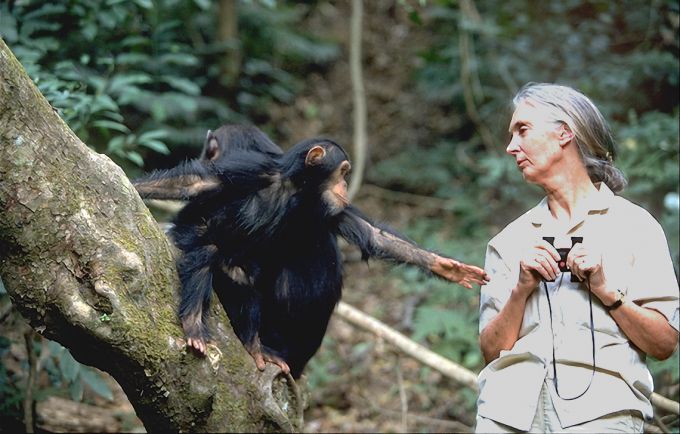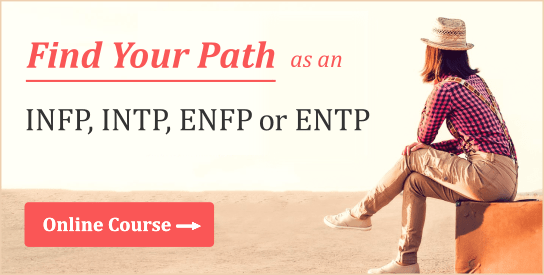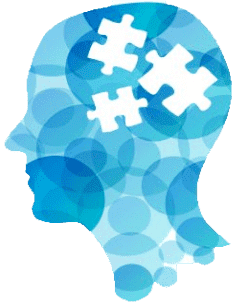According to type theory, every personality type has four functions at its disposal. For the INFP, these include: Introverted Feeling (Fi), Extraverted Intuition (Ne), Introverted Sensing (Si) and Extraverted Thinking (Te). And as we explored in our recent post, 3 Roles of the INFJ, individuals of a given type can present quite differently depending on which particular function(s) they’re employing and emphasizing. All the functions play specific roles, which I like to call “function roles.”
In addition to the roles played by each function, multiple functions can join forces and work toward a common purpose. This probably occurs more often than not, as most activities and careers tend to require regular use of at least two functions.
In keeping with the approach I used to examine the INFJ roles, here we will explore and analyze three roles of the INFP—empath, artist, and scientist—with an eye toward the particular functions being highlighted in each case.
As we proceed, bear in mind that roles are not synonymous with careers. A role is more like an archetype—a deep, psychobehavioral schema that has shaped and guided the lives of individuals for millennia. One can play the role of scientist, for instance, without having a scientific career or credentials. Indeed, the scientist role surely existed well before the advent of the formal sciences. That said, we would surely expect those pursuing scientific careers to self-identify with the scientist role.
The INFP Empath (Fi)

INFPs are generally uncomfortable with conflict and will do what they can to avoid it. This is why many INFPs score as type 9 on the Enneagram, often dubbed “The Peacemaker.” Moreover, INFPs are typically more concerned with maintaining inner peace (Fi) than with directly brokering outer peace. Of course, these two aims are not entirely unrelated. Because empathic INFPs tend to be meek, patient and accepting, they are unlikely to stir up conflict. However, if they were to suddenly encounter an external conflict, many would feel unqualified to step in and resolve it directly. Instead, most prefer an indirect approach, having more to do with one’s way of being than with words or actions. Empathic INFPs feel that the embodiment of peace, love and acceptance can be contagious, capable of engendering a similar mode of being in others. This belief is intimated in Gandhi’s famous dictum: “Be the change you want to see in the world.”
INFPs bring a similar empathic presence and mode of being to parenting. Rather than directly instructing or imposing strictures on their children, they aim to provide a loving and supportive environment that allows their young ones to authentically explore and develop as individuals. The same holds for INFP yoga instructors (a common INFP vocation), who regularly recite something along these lines to their students: “This is your practice. If you don’t feel comfortable doing pose X, do whatever feels right to you.” INFP mental health professionals adopt a similar mindset, one geared toward honoring and empathizing with the unique path and struggles of the individual. Rather than imposing their beliefs or desires on their clients, they strive to unconditionally support them wherever they find themselves on their life’s path; psychologists refer to this as “unconditional positive regard.”
While judging (J) types may at times criticize such methods as unduly passive or hands-off, there is something profoundly important about what INFP empaths bring to humanity. Namely, they show us, in a subtle but genuine way, that we are loved and accepted just as we are. So many people, wittingly or not, are longing for this sort of unconditional acceptance, and no type is better equipped to furnish it than the INFP.
Empath career examples: healthcare, education, counseling, non-profit work
The INFP Artist (Fi-Ne)

INFP artists typically test as Enneagram type 4 rather than type 9, a fact which highlights the potential for substantial differences among individuals of the same Myers-Briggs type. In contrast to empaths, who are animated primarily by INFPs’ dominant function, Introverted Feeling (Fi), artists are hungry to exercise and develop the auxiliary function, Extraverted Intuition (Ne). Ne is a prodigiously creative function, adept at innovation, divergent thinking, and seeing new connections among ideas.
INFP artists also rely heavily on Fi, but they do so with a different aim than their empathic counterparts. Whereas empaths strive for inner peace and harmony, artists hope to cultivate passion and inspiration to fuel creative self-expression. Moreover, they employ Fi with a concern for what makes them unique as individuals. This craving for self-knowledge drives the creative process for many artists, who often experience a sense of “finding themselves” and their passion when immersed in their craft.
Artists are typically more self-absorbed, introspective, and restless than empaths. Instead of finding peace and contentment with life as it is, they’re often searching for inspiration, sorting out their emotions, or trying to figure themselves out. If the empath is directed toward being, the artist is wired for becoming. Like their art, they see themselves as a work in progress. They are seekers, plagued by the sense that some critical element is missing from their lives or self-understanding.
Another cherished notion among artists is authenticity. Underlying this one often finds a “me against the world” mentality in which the INFP pits his individuality against the customs and conventions of society. The goal for the authentic person is thus seen to involve “staying true to oneself” and avoiding “selling out.” Such individuals are apt to see themselves as outsiders, as privy to a more accurate and penetrating view of the world than “ordinary” people.
While empaths also appreciate and embrace individual differences, their approach to authenticity is less defensive and aggressive, and without the me versus world mentality. Of course, we can also imagine a sort of artist-empath hybrid type that incorporates the strengths of each. Such an individual would be both introspective and peaceful, creative and empathetic, self-expressive and a supportive presence.
Artist career examples: musician, writer, graphic designer
The INFP Scientist (Ne-Si-Te)

Our final role, that of the scientist, is marked by a greater emphasis on INFPs’ inferior function, Extraverted Thinking (Te). As discussed in my book, My True Type, modern science is in many respects the quintessential embodiment of Te, aimed at rationally explicating and manipulating the structures and mechanisms of physical reality.
If one of science’s chief tenets is to minimize human subjectivity in hopes of maximizing objectivity, one is forced to wonder how the INFP scientist’s Fi will get its due. At least in some cases, Fi seems to provide the value context for certain scientific enterprises, such as compelling the INFP to find the cure for a certain disease or to otherwise alleviate human suffering. We might discover a similar motivational process at work in TJ scientists, who also use Fi and Te in combination (the only difference being that Fi comes after Te in TJs’ function stack).
Ne also plays a part for the INFP scientist, supplying an insatiable curiosity toward the underlying complexity and unsolved mysteries of life. That said, those with strong Ne development may find themselves getting impatient with the snail’s pace of the scientific process. They may thus explore alternatives such as science writing, perhaps even science fiction, as a way of marrying Ne artistry with scientific knowledge (Te). This need for creativity, not to mention more immediate gratification, is one reason more INFPs become artists than scientists. While they may remain lifelong science nuts, many are simply too restless to endure the more tedious and exacting (Si) aspects of scientific work. We see the reverse in TJ types, who may flirt with the idea of becoming artists, but ultimately find themselves more at home in structured (Te) work roles.
This highlights the importance of the ordering of a type’s functions. While it is wise to consider the needs of the tertiary and inferior functions, embracing and nurturing one’s signature strengths—i.e., those associated with the dominant and auxiliary functions—is typically the foremost priority. For INFPs, this involves consistent use and development of their Fi and Ne talents, often in roles involving some combination of human concern, creativity, and exploration of values, ideas, or possibilities.
Scientist career examples: sociologist, biologist, geologist
Want to learn more?
If you’re an INFP looking to better understand yourself, your personality, or your role in the world, be sure to explore our books and online course, Finding Your Path as an INFP, INTP, ENFP or ENTP:


Fel says
I always marvel at how close to home your points are. Esp for INFP, which is quite complex even for myself to understand at first, but over time pieces fall into place and while I am learning to try not to put too much focus on the MBTI lest I see people in colored boxes, I read your posts am both amused and amazed.
I am most definitely a 4w5 INFP, in the artist category. even with a mundane day job, I’m always thinking and searching for inspiration, read up all sorts of in-depth research on a range of things and would much prefer to hole up in solitude to toil over an art piece to get into the zone. I had been asked to hold classes or do commissions before, but the idea of clients stress me out to no end, and the idea of losing authentic expression in favor of churning out something preferable for the mass market is unacceptable to me. I’ve always had internal struggle and anxiety regarding this issue about not becoming a commercial ‘artist’. I have come to accept this part about me, but I almost wish you didn’t write the ‘figure themselves out’ part because sometimes I also wish this weren’t written in this personality as well. I remember having at one point a huge internal crisis when my mind wouldn’t stop racing, feeling like my self identity was put into question and shaken into pieces with existential questions that my mind wouldn’t stop asking about, feeling so detached from people. I still do feel that sometimes, but that’s when I learned how meditation is so crucial for maybe people like me.
INFPs have some really powerful concoction to make our own lives wonderful and hell, I guess.
JULIE TARA says
Thank you for this insightful article. I really related deeply to the combination of empathic and artist, yet also to a slightly lesser degree to the scientific side too. My passions have drawn me to lead a very artistic life as a dancer, poet, painter, dreamer and healer with a strong interest in the science of healing frequencies like sound, earth energy, solar energies, etc. So reading this makes me feel I’ve been aiming to integrate these three aspects as best as I can.